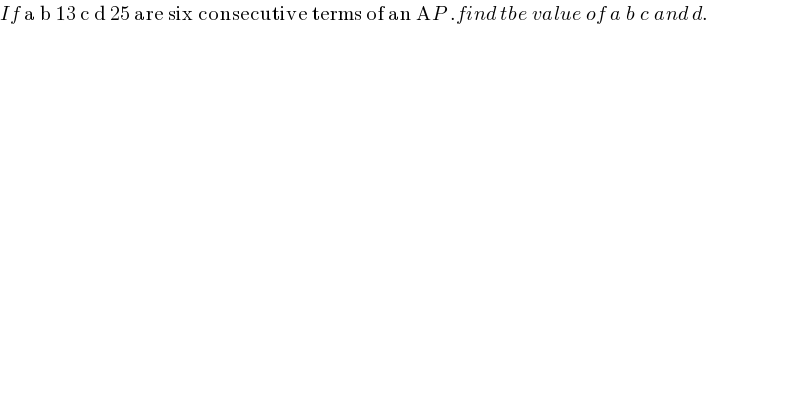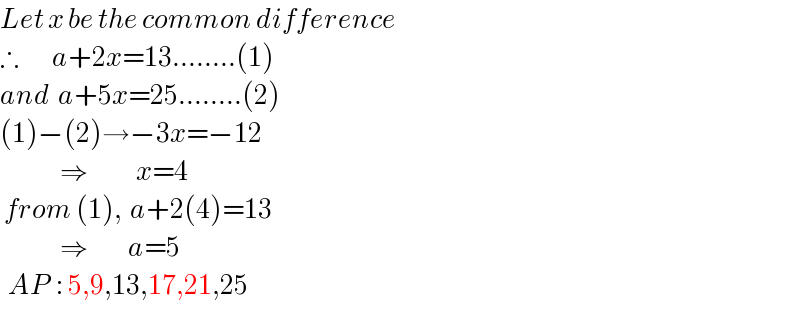Question Number 107353 by Yusufa last updated on 10/Aug/20

$${If}\:\mathrm{a}\:\mathrm{b}\:\mathrm{13}\:\mathrm{c}\:\mathrm{d}\:\mathrm{25}\:\mathrm{are}\:\mathrm{six}\:\mathrm{consecutive}\:\mathrm{terms}\:\mathrm{of}\:\mathrm{an}\:\mathrm{A}{P}\:.{find}\:{tbe}\:{value}\:{of}\:{a}\:{b}\:{c}\:{and}\:{d}. \\ $$
Answered by john santu last updated on 10/Aug/20

$$\:\:\:\:\:\:\:\divideontimes\mathrm{JS}\divideontimes \\ $$$$\Rightarrow\mathrm{13}−\mathrm{2}\lambda,\mathrm{13}−\lambda,\mathrm{13},\mathrm{13}+\lambda,\mathrm{13}+\mathrm{2}\lambda,\mathrm{13}+\mathrm{3}\lambda \\ $$$$\mathrm{so}\:\mathrm{13}+\mathrm{3}\lambda\:=\:\mathrm{25}\:\Rightarrow\lambda=\:\mathrm{4} \\ $$$$\mathrm{now}\:\mathrm{you}\:\mathrm{get}\:\mathrm{the}\:\mathrm{value}\:\mathrm{of}\:\mathrm{a},\mathrm{b},\mathrm{c},\mathrm{d} \\ $$
Answered by nimnim last updated on 10/Aug/20

$${Let}\:{x}\:{be}\:{the}\:{common}\:{difference} \\ $$$$\therefore\:\:\:\:\:\:\:\:{a}+\mathrm{2}{x}=\mathrm{13}……..\left(\mathrm{1}\right) \\ $$$${and}\:\:{a}+\mathrm{5}{x}=\mathrm{25}……..\left(\mathrm{2}\right) \\ $$$$\left(\mathrm{1}\right)−\left(\mathrm{2}\right)\rightarrow−\mathrm{3}{x}=−\mathrm{12} \\ $$$$\:\:\:\:\:\:\:\:\:\:\:\:\:\:\:\Rightarrow\:\:\:\:\:\:\:\:\:\:\:\:{x}=\mathrm{4} \\ $$$$\:{from}\:\left(\mathrm{1}\right),\:\:{a}+\mathrm{2}\left(\mathrm{4}\right)=\mathrm{13} \\ $$$$\:\:\:\:\:\:\:\:\:\:\:\:\:\:\:\Rightarrow\:\:\:\:\:\:\:\:\:\:{a}=\mathrm{5} \\ $$$$\:\:{AP}\:\::\:\mathrm{5},\mathrm{9},\mathrm{13},\mathrm{17},\mathrm{21},\mathrm{25} \\ $$
